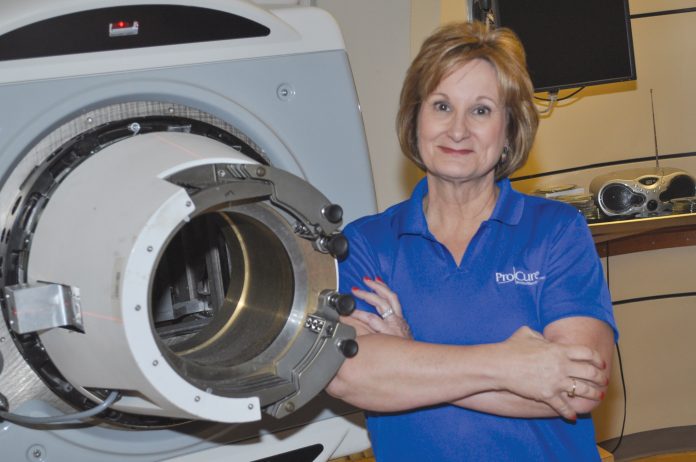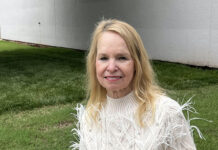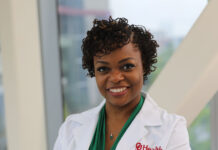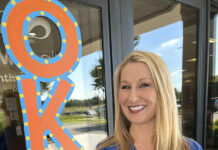
by Mike Lee, Staff Writer
When Claire Carrick received the news that her son Noah had been diagnosed with rhabdomyosarcoma it hit her with a force she had never felt.
When she learned that her 18-month-old’s best shot at a cure was on another continent the pediatric optometrist and her husband packed a few suitcases at their Manchester, England home and got on an airplane.
Luckily for Noah’s family, Diana Schaeffer, MPH, MSN, APRN-CNP and the ProCure Proton Therapy Center were waiting to receive them.
“I was quite frightened. We didn’t know what to expect,” Carrick said. “We didn’t know what the treatment would entail. We were uprooted to somewhere that was completely different. Diana was there to talk us through.”
Schaeffer’s speciality is pediatric cancer patients, both foreign and domestic.
ProCure maintains a contract with the National Health Service in the United Kingdom. Patients from England, Scotland and Wales will find their way to Oklahoma and Schaeffer.
Word has traveled quickly about what ProCure has to offer bringing in patients even from China and Bahrain.
“It’s very difficult,” Schaeffer said. “If you can imagine your world being turned upside down by a cancer diagnosis with your child and now you have to pick up and take your child where you don’t know anybody. You don’t know where you’ll be staying and you have no idea who these people are that you’re going to hand your child over to.”
Schaeffer’s nursing career began in an emergency room setting. From there she worked for an insurance company doing utilization review. A master’s in public health followed as did a position as the chief of nursing services for the Oklahoma State Department of Health.
She earned her APRN in the process.
“I just felt a need to put that to work,” Schaeffer said.
In 2012 she found ProCure.
“You know, when you’re trained as a nurse you’re kind of trained with some cultural sensitivity but you really aren’t quite trained to deal with day-to-day how to live and how to entertain them daily while they’re here. Most of your training is hospital-based but we’re not a hospital.”
Many out-of-town visitors will stay at the nearly Staybridge Hotel, which nurses have nicknamed “The Colony.”
But they have almost daily appointments at ProCure.
“It’s very easy to get very close to these families,” Schaeffer said. “I keep in touch with all of them as they go home. I know my patients and my families very well. I see them almost every day.”
Carrick said the 10-week stay in Oklahoma City was difficult but Schaeffer and her husband helped soften the blow.
“She’s on speed dial with us,” Carrick said.
ProCure is one of two proton centers in the nation that treat UK pediatric patients while the country builds their own proton centers.
ProCure Treatment Centers is a privately held health care company dedicated to improving the lives of patients with cancer by increasing access to proton therapy.
The company was founded in 2005 in Bloomington, Ind., and is the first to develop a network of proton therapy centers in cities across the United States.
ProCure’s solution reduces the time, cost and effort necessary to build and operate a facility. ProCure is advancing proton therapy by collaborating with radiation oncology practices and hospitals to develop centers through innovation and improvements in technology, and by providing training at the world’s only educational facility specializing in proton therapy.
Schaeffer also coordinates care with OU Children’s Hospital if patients need chemo in addition to proton therapy. She relays information back to the child’s care team in the UK, acting as their “constant clinical lifeline” as she says. And since no one travels with their family doc, Schaeffer even provides urgent care for any of the family’s needs while here.
“I just kind of fell into it,” Schaeffer said. “I think I’m in the only nurse practitioner in the state that does any kind of radiation oncology and I know that I’m the only proton nurse practitioner.”
Carrick said the nine-hour plane ride to Oklahoma City gave the family plenty of time to wonder what they would encounter across the pond.
Once they arrived there was a definite dose of culture shock. And being in Oklahoma City during the spring meant the Carricks got to hear their first tornado siren.
“Diana was on Facebook with me telling me we were fine,” Carrick said.
The Carricks still have a road to travel. They left in mid-May and Noah’s central line was removed before the travels. That will have to be reinserted on arrival back home.
A kidney function test is scheduled and then an MRI in three months.
But whatever the Carrick’s face, Claire knows they won’t have to face it alone.
“She’s our nurse,” Claire said of Schaeffer. “But she’s our friend now as well.”












